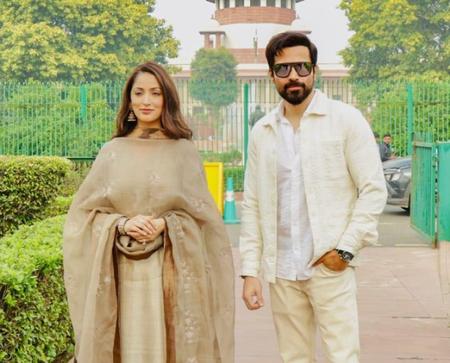

Mumbai, Oct 30 (IANS) Actor Emraan Hashmi, who is gearing up for the release of “HAQ,” shared the deeper meaning behind recreating the film’s poster outside the Supreme Court.
In an exclusive quote shared with IANS, the ‘Murder’ actor said the act wasn’t just a promotional move but a symbolic representation of the film’s powerful narrative about justice and courage. Emraan shared, “Recreating the Haq poster in front of the Supreme Court wasn’t just a visual moment; it was symbolic. The film is inspired from a landmark case that changed the course of justice in India, and standing there reminded us of the real stories that inspired it.”
Yami Gautam added, “Justice may take time, but it never leaves you alone. HAQ is a voice that sparks reform, and with this film, we revisit that once powerful judgement that ignited reform.”
Emraan and Yami, who have kickstarted Delhi promotions for their film, recently revisited the iconic steps of the Supreme Court of India to recreate the poster of their upcoming film, “HAQ.” The Supreme Court of India plays a pivotal role in the film, symbolizing its core conflict—the clash between personal law and secular law. Haq draws inspiration from a landmark Supreme Court judgment delivered in the 1980s, which continues to hold relevance even today.
Directed by Suparn Verma, “HAQ” tells the story of a Muslim woman who challenges the system and takes her battle to court, seeking justice for herself and her children under Section 125. The film delves into themes of faith, identity, liberalism, and the complex interplay between personal laws and the Uniform Civil Code envisioned under Article 44. The film is slated to hit theatres on November 7, 2025.
At the film’s trailer launch event, Emraan Hashmi was asked whether being a Muslim made it feel like an added responsibility to take up a project like “HAQ.”
He said, “When I read a script like this, I see it as an actor, and for the first time in this film, I also had to bring in the perspective of a Muslim. Going back to the landmark case, the country was divided into two parts. One was on the side of religion and personal faith, the other was on the side of constitutional rights and secular rights. But, I wanted to see if the director and writer’s point of view in this film is balanced, unbiased, and neutral? So the short answer is ‘yes’. It was very neutral.”
–IANS
ps/
